Jacob Creath, Jr.
1799-1886
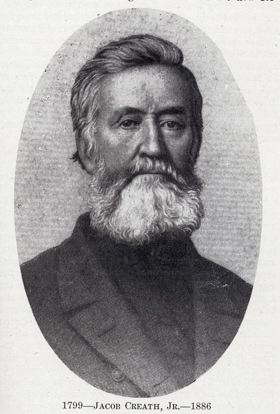
A child born January 17, 1799, was destined to stand side by side with the truly great of his day as he labored with such men as Alexander Campbell, Barton W. Stone and John Smith to restore New Testament Christianity in nineteenth century America.
Jacob Creath was born to Lucretia Brame Creath and William Creath in Mecklenburg County, Va.; one of sixteen children. His father, a Baptist preacher, travelled extensively. Much of the early training of young Jacob was left to his mother who was said to be of strong character and dedication. He was named Jacob in honor of his uncle and the designation "junior" distinguished between the two. (1. Phillip Donan, Life Of Jacob Creath, Jr, Indianapolis; Religious Book Service, nd. p. 46.)
EDUCATION
Creath's early education was at a school taught by Joshua Stanley. He progressed not only in "reading and spelling," but also acquired the "indispensable art of writing," taught by Jones Gee. As he grew older, he carefully studied the New Testament, and when a young man of twenty-two studied English, Latin, and Greek Grammar.
With his studied of the New Testament, young Jacob developed a deep concern for his spiritual welfare.
"I never say the day," he said, ''when I did not desire to be good and please God, my Maker. I often withdrew to retired places and prayed to him that I might see a great light shining around me, like Saul of Tarsus; or hear a voice informing me that my sins were pardoned. Under these circumstances, nature some· times gave way; and 1went to sleep on my knees, overwhelmed with the dreadful consideration that I was forever lost...” (Donan, p.49)
His early instruction in spiritual matters had been that the only chance for salvation necessitated being "born again," but no one could explain how this was accomplished.
"Had I been told," he later said, ''to believe on the Lord Jesus Christ, repent, and be baptized for the remission of my sins, I could have been a Christian at ten years of age.....” (Donan, p. 48) But it was many years before these facts of the gospel were clear to Jacob Creath, Jr.
In April. 1817, at the Ready Creek Baptist meeting house in Brunswick County. Va.. seventeen year old Creath answered the invitation to anyone " ...in distress of mind to come forward and be prayed for.....” (Donan, p.51) In May of the same year. he was baptized by his father in William's Creek. Having been "recruited" into the fellowship of the Baptist Church. He "...continued to praise God and rejoice." (Donan, p.55) His ordination to preach in the Baptists church took place February 15, 1818. and the license was signed by his father, William Creath.
Creath attended the University of North Carolina at Chapel Hill, studying Latin, Greek, English and Theology. He remained at Chapel Hill during the year 1819 and the fall of 1820. In November, 1821, he enrolled as a student in Columbia College in Washington City. D. C., where he remained until December, 1823.
FIRST PREACHING EXPERIENCE
With his formal education complete. Creath moved to Kentucky where he was recognized by the area Baptist churches as a "much beloved and worthy brother," one who, though but a young man, had "respectable talents as an orator," had an "aptness to teach," and "admirable qualities which constitute a faithful minister of Jesus Christ...” (Donan, p.73)
In October, 1826, Creath left Kentucky and travelled with his cousin, Albert Gallatin Creath, the son of Jacob Creath. Sr. They spent several days at the Hermitage in Nashville. TN., the home of General Andrew Jackson. (This was three years before Jackson became president of the United States.) A preaching tour of the South took him into Louisiana where his preaching excited violent opposition among the Presbyterians. Methodists and Episcopalians. He became ill in the fall of 1827, and upon recovery left New Orleans in early 1828. (Donan, p.75,76)
BEGINNING OF CONTROVERSY
Back in Kentucky, Creath was invited to preach once a month for the Clear Creek Baptist Church in Woodford County, with the understanding that his preaching would not interfere with the "regular worship of the church...” Much turmoil was caused by the question, "Are not authoritative human creeds, as tests of fellowship, contrary to the will of God, and a source of discord among his people?" (John A. Williams, Life of Elder John Smith; (Indianapolis; Religious Book Service, 1870) p. 314.) On the first Sunday of every month, Creath delighted many of his listeners with "arguments against all ecclesiastical creeds and covenants." Dissension resulted which forced Creath and the "anti-creed" brethren to assemble in the woods near the meetinghouse. Following an abstinence of nearly two years, they restored the practice of partaking of the Lord's Supper on the first day of the week. (Williams, p.315).
In 1829, Creath continued his preaching at Versailles, Cane Ridge and South Elkhorn. A change was taking place in his preaching which led to what he classified as "the most remarkable event of my life." The change led to a loss of esteem he had enjoyed among his fellow Baptists. He received a letter from William Suggett, a representative of the Great Crossing Baptist Church in Scott County. Ky. The letter read:
Dear Brother,
I send you the request of the greatest portion of the Crossing church. Their desire is that you will give your views of man as a sinner, and how the change takes place so as to constitute him born again. Or, in our familiar way, as Baptists, we want your views of experimental religion; how a sinner is brought from a state of enmity against the Savior to be a lover and worshipper of Him.
This request has grown partly from reports and partly from a number of brethren, who have heard you preach since your return from the South, conceiving that you had abandoned your old mode and views of preaching under which their hearts were many times gladdened, and have sat under your ministry with great delight; and we would ask our divine Master to grant you his Spirit, that you may rightly divide the word of truth, giving saint and sinner "his portion in due season." The above request, I hope, brother, has arisen from the best feelings of my heart. I say this because it originated in my own breast, seeing so many of the brethren that loved you as their preacher, when here before (before you went South), had determined that they did not care to hear you any more; and, in fact, would not come to meeting if something like this had not been requested. O Lord! keep us from prejudice, and lead us in the way of truth!⎯William Suggett (Donan, p.78,79)
The younger Creath was questioned by his uncle, Jacob Creath, Sr., as to how he proposed to answer the charge. He answered that the main indictment against him was his view concerning the direct operation of the Spirit of God upon the heart of the sinner. He took the position that "the word of God is the grand instrumentality by which the hearts of sinners are changed." His uncle admitted these things were true, but thought it was not "prudent to say much about them at present, as public mind was not sufficiently enlightened to appreciate them; and our enemies would handle them with great effect against us. (Donan, p.80,81)
For his defense before the Great Crossing Church, Creath read from the book of Acts, Paul's defense before Agrippa and Festus. John T. Johnson, then a member of that congregation, was indignant because of their treatment of Creath and made this statement: "Absolutely, if they don't let that man alone, the stones of the street will cry out against them!" (Donan, p.82) He later attributed his becoming a part of the Restoration Movement and "becoming a power in the work," (Mattie L. Berry, A Sketch of the...Disciples of Christ at Versailles, Ky., 1930) to Creath and the treatment he received form the Baptist Church.
CONTROVERSY ACCELERATES
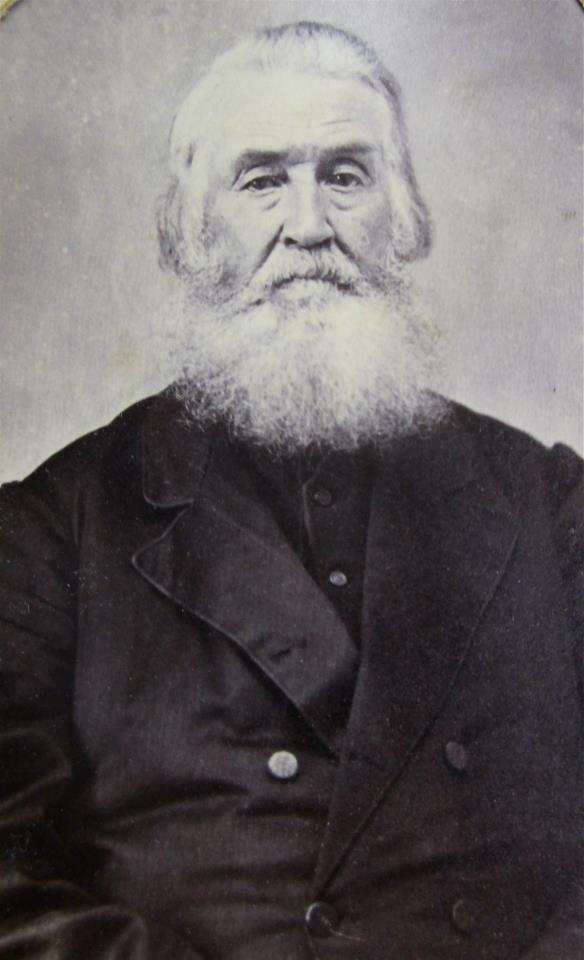
An Older Jacob Creath, Jr.
compliments of Terry J. Gardner - 06.2012
Events in the life of Creath were unfolding as a "restoration" was taking place in his own heart. While he and his uncle were visiting in the home of Samuel Nuckolds, near Versailles, Ky., they met Raccoon John Smith. While discussing the operation of the Holy Spirit and the meeting at the Crossings church, Creath found, to his delight, that Smith's beliefs concerning the matter were the same as his own. His uncle retained some doubts, but later "embraced them with all his heart. (Donan, p.83)
In August, 1829, the Elkhorn Baptist Association met in Lexington, Ky. in an effort to remove from their fellowship those who "...favored the adoption, for their infallible standard, the Bible along." John T. Johnson, Dr. Joseph Chinn and others in the meeting rose to their defense; thus giving Creath another year "...in enlightening the public mind before our affairs where brought to a crisis." (Donan, p.83). During this time, he published the Christian Examiner.
In December, 1829, Creath left Lexington in the company of Alexander Campbell on a preaching tour which took them to Nashville, Tenn. While in Nashville, Campbell held the famous debate with Obediah Jennings, a Presbyterian minister, which was published in the Harbinger. On the return trip, they preached in cities in Southern Kentucky and returned to Lexington where Creath remained while Campbell continued on to Bethany, W. Va.
FINAL CHARGES
In 1830, the Elkhorn Baptist Association again met for the express purpose of removing from their midst the Creaths, John Smith and others who held the belief that God's Word as "the infallible rule of faith and practice." (Donan, p.88)
The Frankfort Association, though not scheduled to meet for its regular session until two months later, also met to bring charges against the Creaths. The charge against them was that they were not preaching "Baptist doctrine." (Donan, p.89). As Jacob Creath, Sr., Jacob Creath, Jr., and John Smith rose to speak, each in their turn, they were "stamped down," and were not allowed to give their defense.
"I tried to tell them" Creath wrote, "that I was prepared with witnesses and documents, to disprove any charge against me. I was most peremptorily ordered to sit down, and clapped down." (Jacob Creath, Jr., Memories of Elder Jacob Creath, Sr., (St. Louis; T. W. Ustick, Printer, 1866) p. 41.)
Jacob, Creath, Sr., with this hand upon his white head said:
"I am sixty years old; I have been forty years in the service of my God and my country; and this is the first time in my life that I ever knew a man arraigned under charges, in a civilized country, without the privilege of answering for himself or by his counsel. (Creath, Jr., p.41).
He was repeatedly and loudly ordered to sit down without the liberty of speech, "in the capital of the great State of Kentucky on the fourth day of July, in the year of light and grace 1830." John H. Warring, "one of the wickedest men in Kentucky," was there and witnessed these acts of "Baptist justice," and swore it was worse than the Spanish Inquisition. (Creath, Jr., p.42) The final break with the Baptists had come.
MARRIAGE
In September, 1831, Creath married Mrs. Susan Bedford, the widow of Sidney Bedford, of Bourbon County. He did some farming and preached on Saturdays and Sundays. As a family man, he began early to train his children and those who worked for him in the ways of the Lord, offering devotions and instruction three times a day. In the fall of 1839, he moved his family to Missouri where he continued to preach the gospel, often traveling great distances from home. His wife, having suffered a permanent injury as a result of a fall from a horse shortly before the birth of their son, died on July 16, 1841, at the age of 32 years. (According to Donan, p. 131, Susan actually died of consumption - added by web editor sdh)
Creath continued his work, preaching throughout Missouri and surrounding states, going as far west as Iowa. While preaching in a meeting at Bowling Green, Creath met Mrs. Prudence Rogers who became his wife in March, 1842. She remained a faithful and devoted wife as long as he lived.
PHYSICAL AND SPIRITUAL CHARACTERISTICS
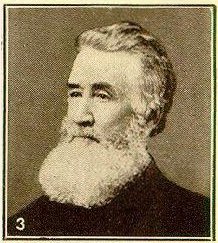 Jacob Creatb, Jr. was a man of deep conviction, energetic and excitable. He was a large man, weighing over 200 pounds, standing tall and straight even into advanced age. In 1877, John A. Brooks wrote, "He is a man of magnificent proportion, and under the weight of nearly eighty years stands as erect as an Indian." He had brown hair, gray eyes, and it is said his voice was “strong and clear.” (Thomas Preston Haley, Historical and Biographical Sketches, (St. Louis, 1888) pp. 452, 453)
Jacob Creatb, Jr. was a man of deep conviction, energetic and excitable. He was a large man, weighing over 200 pounds, standing tall and straight even into advanced age. In 1877, John A. Brooks wrote, "He is a man of magnificent proportion, and under the weight of nearly eighty years stands as erect as an Indian." He had brown hair, gray eyes, and it is said his voice was “strong and clear.” (Thomas Preston Haley, Historical and Biographical Sketches, (St. Louis, 1888) pp. 452, 453)
His deep love for the Lord was evident; his presentation of the gospel often moved his hearers to tears. He was known for the sincerity of his prayers which was noted when he was still a very young man. Following his first sermon, an opinion was expressed on the subject. In relating the event, Creath said, "An old lady present remarked that "I made a good prayer' but she didn't think I would ever make a preacher.' The old lady's views and mine corresponded precisely on that subject. And I thought if God would forgive my first offense of the kind, I never would repeat it." (Haley, p.432) Creath underestimated his own abilities, for the time was to come when people would come by the hundreds to hear him preach in city after city. He came to be regarded as one with great ability and stamina in preaching the gospel. "Many regarded him as dogmatic in spirit... No one could get him to turn away from the truth or persuade him to suppress it or compromise with error.” (H. Leo Boles, Biographical Sketches of Gospel Preachers, (Nashville; Gospel Advocate, 1932) p. 92)
Creath was steadfast in his beliefs, and was strong in his opposition to missionary societies. At one time, expressed the desire that these words be inscribed as an epitaph on his tombstone: "Here lies Jacob Creath, who opposed all societies to spread the Gospel except the individual churches of Christ, "because he believed such societies to be destructive of the liberty of the churches and of mankind...” (William E. Tucker and Lester G. McAllister, Journey in Faith, (St. Louis, The Bethany Press, 1975. p. 249.)
His denunciation was strong against the formation of any human creeds. Of these he wrote: "If the creed agrees with the Bible, they are as useless as a fifth wheel to a wagon; if they disagree with the Bible, they are pernicious and impious, and should be burnt... This argument sets them aside forever.” (Jacob Creath, Jr., Essays Against the Utility of Human Creeds, (St. Louis, Printed by Daniel Davis, 1845)
He was opposed to the "introduction of politics" into the pulpit and spoke emphatically against war. During the Civil War he was forced to remain at home much of the time, and he referred to this time as "barren of matter...” (Donan, p. 182) He hated war, and stated he "...could not be induced by honors nor money to go to war.” (Donan, p. 192) His feelings were evident when he wrote, "Let our watchword be Peace! I abhor war as antichristian. I hold it to be the greatest of crimes..." and, "a hatred of war is an essential feature of practical Christianity." (Boles, p.94,95) Benjamin Franklin, John W. McGarvey and Alexander Campbell shared his view of neutrality. (Tucker And McAllister, p. 201,202)
Creath had strong opinions and often expressed himself in colorful language. He suggested that the eleventh commandment should be that, "Every man is to attend to his own business, and not good manners in places of worship, is like a boy attempting to read before he has learned to spell well. Good manners first, then religion afterward.” (Donan, p. 188) He also stated that, "One reason why we hear so many complaints of the preacher is that the people are not in a proper frame of mind to hear...” (Donan, p. 185)
HIS DEATH
His work completed, Jacob Creath, Jr. died January 9, 1886, in Palmyra, Mo., where he had made his home since 1846. He had instructed his wife that there be no funeral service since Jesus had none, and neither did the apostles. She honored this request. He was laid to rest in a plain, simple coffin in which was placed his Bible and a copy of the Living Oracles by his friend and co-worker, Alexander Campbell. He was a man greatly loved but often misunderstood. Of him it was said by John F. Rowe, editor of the American Christian Review, "...he was made of such stuff as martyrs...” (Earl West, The Iron Duke: Epilogue, Memoirs of Jacob Creath, Jr. by P. Donan; (Indianapolis; Religious Book Service) pp. 15, 16)
In his later years, he had written of his mother and his last visit with her. "The Lord bless you, my son, Jacob," she said as she held him in her arms and kissed him for the last time. ''You have been a good son to me! If I never meet you on this earth again, I hope to meet you in the resurrection of the just!” (Donan, pp. 158, 159)
⎯Clifford May, Triumph And Tragedy, ed. Paul Vaughn, pgs. 213-221
![]()
Biographical Sketch of Elder Jacob Creath Jr.
It was said of Bloody Mary, Queen of Scots, that “she feared the prayers of John Knox more than the army of ten thousand men.” While it was Martin Luther who exposed the immoralities of the Romish priesthood and uncovered the base practices of the Papal Church, and while it was John Calvin who plunged his polemical sword into the monstrous doctrines of the Papal hierarchy, it was the redoubtable John Knox, who, at the same time, struck such severe blows at the government of the Church of Rome. When we say that our venerable Jacob Creath is the John Knox of the Restoration, we think we make the parallel complete. As a factor in readjusting the ancient order of things, and in helping to crush down the despotic rule of arbitrary ecclesiastical establishments, whether Papal or Protestant, he has served in a place where very few other men could have served with such signal success. As John Knox was a scourge to the Roman hierarchy of his day, and was shunned and feared by the licentious priesthood, so also has Jacob Creath, the unflinching advocate of reform, been a scourge to modern ecclesiastical usurpation, and a terror to all innovations who have sought to make inroads upon apostolic precedent and practice. As the Reformation of the sixteenth century had its brave Luther, its erudite Melancthon, its polished but vacillating Erasmus, its conscientious Zwingle, its great theologian, John Calvin, and its bold and defiant John Knox, so also have we had as pleaders for the immediate restoration of Christianity, these several characters in the nineteenth century.
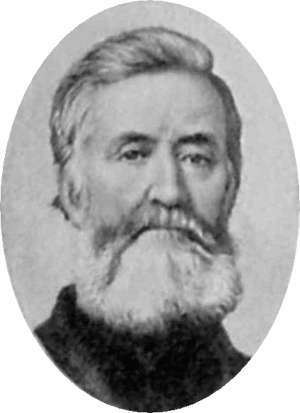 In the person of Jacob Creath we have stalwart Christian manhood, solidity of character, sternness of purpose, invincible will-power, a disposition that tolerates no wrong, a sense of justice that knows no relenting. And yet beneath all this iron framework back of all these projectile forces—there is a royal heart of love for the human family, and an inner life that has an intimate relation to the spirit of God. As one of the best read men among us, if not the most accurate historian, he has, during the last half century, written and spoken on all the great leading religious questions that have been agitated by great minds from time to time. He questions that have been agitated by great minds from time to time. He has written, and very ably and entertaining, on Romanism, Prelacy, Episcopacy, Apostasy, Clerical usurpations, on Creeds and Confessions, on false doctrines, on Church Government, and on elementary, critical, exegetical and homiletical questions, besides collecting and classifying much historical information, both sacred and profane. He is the author of no less than 400 distinct essays on these several subjects. His memory of and places is extraordinary. With the clarion voice of a Jeremiah, he has sounded the alarm of departure and innovation the length and breadth of the “Reformation,” and with the keen vision and spiritual perception of an Ezekiel he has, as with the light of a flaming torch, laid bare the moral deformities and reckless apostasies of his own brethren.
In the person of Jacob Creath we have stalwart Christian manhood, solidity of character, sternness of purpose, invincible will-power, a disposition that tolerates no wrong, a sense of justice that knows no relenting. And yet beneath all this iron framework back of all these projectile forces—there is a royal heart of love for the human family, and an inner life that has an intimate relation to the spirit of God. As one of the best read men among us, if not the most accurate historian, he has, during the last half century, written and spoken on all the great leading religious questions that have been agitated by great minds from time to time. He questions that have been agitated by great minds from time to time. He has written, and very ably and entertaining, on Romanism, Prelacy, Episcopacy, Apostasy, Clerical usurpations, on Creeds and Confessions, on false doctrines, on Church Government, and on elementary, critical, exegetical and homiletical questions, besides collecting and classifying much historical information, both sacred and profane. He is the author of no less than 400 distinct essays on these several subjects. His memory of and places is extraordinary. With the clarion voice of a Jeremiah, he has sounded the alarm of departure and innovation the length and breadth of the “Reformation,” and with the keen vision and spiritual perception of an Ezekiel he has, as with the light of a flaming torch, laid bare the moral deformities and reckless apostasies of his own brethren.
Jacob Creath, so well known to the brotherhood, and especially to the readers of the Review was born January 17, 1799 on Butcher’s Creek, Mecklenburg Co., Va., six miles from Boyden, the county seat. His ancestors were reared in the Presbyterian faith. His father, William Creath, was born Dec. 23, 1768, during the passage of his father (Jacob’s grandfather) and mother from Dublin, Ireland, to Nova Scotia. William the father of Jacob, continued in the Presbyterian faith, until 1787, when, upon profession of his faith in Christ, he was immersed by Elder Henry Lester, and joined a Baptist congregation in Granville, North Carolina, under the pastoral care of Elder Thomas Bass. He was educated at that period of time in the history of the Baptist Church in America, when young preachers were informed that “special preparation for the performance of their public duties was unnecessary, inasmuch as the Holy Spirit on such occasions, would directly communicate to their minds all the thoughts and words which were requisite.” William was the contemporary and friend of John Leland, Robert B. Semple, Andrew Broaddus, Sen., Elder Courtney, Benjamin Watkins, Ely Clay, John Kerr, Richard Dabbs, Robert T. Daniel, James Shelburne, David Barrow, A.W. Clayton and Lewis Lunsford—all bright and shining lights of the Baptist Church. A deist of his acquaintance once remarked that “there were but two things that could make him cry—the one was shaving with a dull razor, the other was hearing William Creath preach.” A member of congress observed, that “he was the only man he ever heard who could deliver a three hours speech without saying something that was not worth hearing.” William was a thoroughbred Baptist, of the hyper-Calvinistic school, and is said to have been a man of great power in the pulpit.
Jacob Creath was one of a family of sixteen children. His maternal ancestors were Virginians, of English descent. His mother’s name was Lucretia Brame, the daughter of Thomas Brame, of Mecklenburg County. She was a woman of strong physical organization, sound common sense, great energy of character, decided in purpose, prudent, candid and modest. She never permitted her children to utter a vulgar word in her presence. When her husband was absent from home she always kept up family prayers. She trained her children to obey her. Her house was a home for Baptist preachers, from Maine to Georgia. She lived to see five of her nine sons consecrate themselves to the ministry of the gospel. The subject of this sketch was for a long period styled Jacob Creath, Jr., to distinguish him from his uncle Jacob Creath, who died “full of years and honors,” at Lexington Ky., in March, 1854.
By the time young Jacob was eight years of age he could spell and read and write. From the time he was eight until twenty-one years of age, he made himself useful on the farm, either on the wagon or following the plow. At night he read by the lurid light of a blazing brush-pile, and while his oxen or horses were feeding and resting, he improved the time by poring over his books. In this manner he carefully read and studied the New Testament. In his twenty-second year he began the study of English, Latin and Greek grammar.
The religious aptitudes of Jacob Creath developed early in life. He had been taught to believe that, in order even to catch a glimpse of Mount Calvary, it was absolutely necessary for people to pass the stormy cliffs of Mt. Sinai, hear the rattle and thunder, and flame and smoke, and feel the quaking of the earth under their feet. They were gravely informed that “they could do nothing, and yet that they would be certainly damned, unless something was done.” He underwent what in that day was denominated “a great law work”—a sort of a spiritual conscience state. “I strove as hard,” he wrote “to observe the laws of Moses as though I had been a Jew.” Much as he desired to become a Jew.” Much as he desired to become a Christian, there was not a man in all the region round about that could give him the correct information. He sought earnestly to placate the anger of God and secure his favor by deeds of self-righteousness, and sometimes thought he had almost succeeded, when, all of a sudden, some gust of wrong feeling, or the shadow of some impending calamity, would drive him from his purpose, and dissipate all his illusive hopes of divine interposition. He even tried to drown his sorrows in the deathly waters of infidelity, but his conscience was too tender, and his religious nature too sensitive, to allow him to accept such an alternative. In the simplicity of his heart he was wiser than his teachers. He truly believed the Bible to be the inspired word of God, and “Jesus to be the Christ, the Son of the living God” as firmly then as now; but the preachers mocked him by telling him that “that was historical faith, and that it would by no means answer his purpose; and that his only chance for salvation consisted in being born again”—by which they some subtle, mysterious operation of the Spirit. “Had I been told,” he said, “to believe on the Lord Jesus Christ, repent and be baptized for the remission of my sins, I could here been a Christian at ten years of age, as easily as at seventeen.
“I never saw the day,” he continues, “when I did not desire to be good and please God, my Maker. I often withdrew to remote places, and prayed to him that I might see a great light shining around me, like Saul of Tarsus; or hear a voice informing me that my sins were pardoned.” Under these circumstances nature sometimes gave way, and I went to sleep on my knees, overwhelmed with the dreadful consideration that I was that I was lost forever. In this state of mind I had alarming dreams. One of them was peculiarly impressive. I imagined that “the day of judgment” had come. The human race were assembled on a vast plain. The Savior occupied a narrow pass between them and heaven, through which only it could be entered. And no one could enjoy that unspeakable privilege but those on whom he conferred a white ball, as a token of his favor. One old sister and myself approached him together. On her he bestowed the pledge of his love; and she passed away from me into the realms of unfading beauty, glory and bliss. Me, he repudiated. I was devotedly attached to my sister, and when I found that we were permanently separated, and that hell was my immortal portion, I awoke, screaming in a paroxysm of terror. Although it is more than fifty years since this incident occurred, the original impression still remains. When I found that the scene was merely a dream, I went earnestly to work to secure my salvation, lest the vision should ultimately prove awful reality.
In May, 1817, he was baptized by his father, after having given in his experience, and at once became a member of the Baptist Church. He was the only one out of a great number who went forward for prayers that united with the Church at that meeting. There was great rejoicing over his conversion, and his own happiness was beyond expression, for his obedience was an intelligent one. He responded to the words of his father, as did Saul of Tarsus to Ananias: “Arise, and be baptized , and wash away thy sins, calling upon the name of the Lord.” He was only eighteen years of age when he delivered his first sermon, which he did under moral compulsion, by taking the place of a preacher who failed to appear. He was licensed to preach Feb. 15, 1818 when he was only nineteen years of age. He studied Latin, Greek and English languages at the University of North Carolina, located at Chapel Hill, and in September, 1820, he was ordained a minister of the gospel, at Mill Creek Meeting House, Caswell County, of the same state. From Chapel Hill he went to Columbia College, as a student, which was then under the supervision of William Staughton, D. D., where he remained two years. When he left this college, he carried with him certificates and recommendations from college officers and church officers that speak in the highest terms of his superior moral worth and literary attainments. After leaving Columbia College, he goes to Kentucky, where he spends two years in the vicinity of Lexington. In 1826 he left Kentucky for Mississippi, and on his journey he visits General Andrew Jackson and other notables having borne with him a letter of commendation from Richard M. Johnson. While in Mississippi he was treated as a heretic by the sects, suffered much persecution from the Presbyterians, Methodists and Episcopalians, but, before leaving the State, he baptized a large number of persons. In 1828, after a sever illness, nigh unto death, and after starting out four men as preachers, he left New Orleans and returned to Louisville. From there he went to Bethany, where he spent some time in the company of Alexander Campbell, and where he wrote an article, entitled “A Blow at the Root of Popery.” The year 1829 he spent in Kentucky, during which eventful period he was tried for heresy by the Baptist Church, at the Great Crossings, Scott County, then under the pastoral care of Silas M. Noel. D.D.
In this year, 1829, Jacob Creath met those distinguished evangelists, Raccoon John Smith and John T. Johnson. He was also well acquainted with Richard M. Johnson. In December of this year he accompanied Alexander Campbell from Lexington to Nashville, returning with him to Lexington, after visiting a number of central places in the two states, Tennessee and Kentucky, preaching to great congregations of people, and baptizing many converts. Dr. Theodore Bell, now an eminent physician in Louisville, and a man of more than ordinary intellectual powers, was baptized by Bro. Creath. In 1830 Bro. Creath Published and edited a monthly paper in Lexington, Ky., called the Christian Examiner. In this same year, he and his uncle, Jacob Creath, Sen., were “ostracized from the Baptist Church,” by the Elkhorn Association, for no other offense than that of preferring the unadulterated word, as “the infallible rule of faith and practice,” above human creeds and Papal traditions. That was a stormy period of the “Reformation,” and the Calvinistic (Hard shell) Baptists raised more of a persecuting breeze at that time than any other people.
In September 1831, Bro. Creath was married to Mrs. Susan Bedford, widow of Sidney Bedford, of Bourbon County. In 1832 he followed the honorable vocation of a farmer, preaching on Saturdays and Lord’s Days at different points in the neighborhood of Lexington. In the years 1832-33, he baptized a great number of people. In this latter year, he and his family passed through a terrible scourge of cholera that visited that part of the State. Between five and seven hundred people died in Lexington, forty persons died within sight of his farm, and though all the members of his family were prostrated by the destroyer, yet out of all his afflictions the Lord delivered him and his family. It was while passing through these dismal scenes that he meditated much on the 46th and 91st Psalms. In 1834 he held a debate with Lewis Green, a Professor of Ancient Languages in Danville College, in which his antagonist was utterly defeated, if we may credit the chronicles of those times. In the month of September, 1835, he and John T. Johnson held a great meeting in Versailles, Woodford Co., Ky., which resulted in the conversion and immersion of 140 persons. During this period of his ministry he was still necessitated to cultivate his farm in order to meet the expenses of his family.
Family worship was one of the prominent features in the Christian life of Jacob Creath. Every morning and evening prayer and praise and thanksgiving ascended from his family altar, and in times of deep affliction he engaged with his family in devotional exercises three times a day. When he was absent from home his wife acted as priestess of the family. While the members of his family were yet with him they read the Bible in course, and within that period had read the Bible through ten times. In addition to this, Bro. Creath every year began on the first day of January at the first verse of Genesis, and on the last day of the year finished the reading of the Bible with the last verse of the book of Revelation. In this way he has read the blessed Bible through more than fifty times!
During Bro. Creath’s stay in Kentucky he baptized quite a number of men of distinction. In 1839 he removed to Missouri. He was very successful as an evangelist in that Start where he frequently co-operated with such men of as Levi Hatchett, B.W. Stone, T.M. Allen and M. Wills. In 1841 he lost his wife, who died of consumption, in her 33rd year. In 1842 he was married to Mrs. Prudence Rogers, his second wife, a “precious jewel” of a wife, who took charge of the children of his first wife. After his removal to Missouri, he made extensive tours into the adjoining States, and traveled up and down the Missouri and Mississippi Rivers, preaching to the people and making many converts. In 1848 he wrote a book against Episcopalianism in which he exposed the moral deformity of the daughter of the Woman of Sin. Beginning in April, 1855, he acted as a very successful agent for the Bible Revision Association for the space of six years. He traveled extensively, south and southwest—as far south as New Orleans—in the interest of this Association, the headquarters of which were located in New York City, and a branch of which was at Louisville, Ky.
Bro. Creath lived in Palmyra, Mo., his residence for many years. He was an extensive traveler, as well as a most successful and indomitable proclaimer of the good news of salvation. His labors of love, and the thrilling incidents connected with his ministerial life would constitute a large volume of rich and entertaining reading, much of which would be worthy of reading if it had been recorded during the days of his busy life, or shortly thereafter. He was a bright and shining star in the galaxy of chieftains of the Restoration. Wherever known, his name was a synonym for honesty, integrity and truthfulness. He always possessed self-conceit enough to give him a very marked individuality. He was given the title “the Iron-Duke of the Restoration” by John F. Rowe. This title he wore very well. He was seen as perhaps the most colorful of restoration preachers and was never afraid to stand up for the truth in the face of an enemy.
Bro. Creath was an extensive author in the papers of his day. He was also an extensive “pamphleteer” among the brethren. Among the papers that published his articles and letters were the Christian Baptist, Christian Examiner, Millennial Harbinger, Bible Advocate, Christian-Evangelist, Christian Pioneer and the venerable American Christian Review. Many of his articles were written from home and in different States. In a short period of time, these writings will be available in a new book: “The Life and Letters of Elder Jacob Creath Jr.” In this way, Bro. Creath’s writings will be available for the first time to students of restoration history.
He wished it distinctly understood that he stood on primitive ground as maintained by Campbell, Scott and Franklin, and also that he was opposed to all clerical associations, all conventions of preachers, and all missionary plans, except the apostolic plan. He was also conscientiously opposed to Christians going to war, on account of which position he suffered some persecution in Missouri in the Civil War. In the Millennial Harbinger, of 1850, Bro. Creath penned this significant sentence: “If Alexander Campbell was right in opposing clerical councils in the Christian Baptist, as his readers believed he was—he was wrong in his pleading for them in 1850, after he turned over to them to prevent the Jerusalem of the Reformation from going to Baltimore instead of Cincinnati. He was compelled to turn by the outside pressure, and being made President of the General Christian Missionary Society, though he did not attend the first one in 1849.” He was also thoroughly anti-organ, and holds that colleges sustained for the education of preachers are not in harmony with apostolic teaching.
Bro. Creath lived a long and very fruitful life. He was either loved or hated…depending on the outlook that you took. One area where he was hated, in regards to the American Christian Missionary Society which was organized in 1849. In spite of the much acclaim that it received from those of a “more liberal” persuasion, Creath stood up from day one and opposed it as going beyond what the Scriptures authorize. Although having a close history with Alexander Campbell, he did not let it go unsaid that Campbell had changed between his “Christian Baptist days” as he put it to the time when Campbell appeared to being led astray by a younger cadre of men in the restoration movement. Creath was unafraid to come out in opposition to his friend of years past when he felt that an incursion was being made upon the truth of the ancient paths. He boldly stood alone, at first, but was then joined by those who sought to study the Scriptures to see if these things were so. Benjamin Franklin, at first, gave a warm reception to the idea of doing missionary work in this manner. He was “taken to task” by Bro. Creath and was soon to change his viewpoint. Even a man as mighty in the Scriptures could be turned by first of all, the truth, and second of all by spending sometime in the woodshed with Creath.
Jacob Creath Jr. was a man of prayer. He held a close relationship with his Father in heaven and spent much time in the prayer closet. Among his co-workers, his prayers were legendary. Once, during the “recent unpleasantness” also known as the “Uncivil War”, a company of Union troops were encamped near to Creath’s home in Palmyra, Missouri with the intention of capturing that city. Creath, as his custom was, went to a grove to pray. The leader of the Union forces saw him retire there and went, perhaps thinking that he would capture a rebel spy, and followed him. It was here where he went to work. He brought forth his family, the church, the leaders of the land and finally for peace. It was here that the trooper heard him. The next day, the body of troops withdrew peacefully without firing a shot.
Another thing Creath was known for was his sense of humor. He also often found himself in a humorous situation. In one story it is said that he rode a horse whom he named “Jack.” He was very protective of this horse and often checked on him while he was stabled in some place while Creath was preaching or holding a meeting. In this particular time, he had asked several times about the horse when the owner finally became annoyed and said “Go tell Brother Creath that I have done everything for his horse I can think of, except to give him a cup of coffee, and I am getting that ready.” In another time, Creath was staying with a family while preaching a meeting. It was wintertime and he was in his own room. The lady of the house told a servant to very quietly sneak into the room and light a fire so that when he awoke, the room would be comfortable when he awoke. Bro. Creath was bald and wore a wig, which he would hang on the bedpost before retiring. Very shortly after entering that room, the terrified servant came running out of the room proclaiming that someone had scalped that preacher in his sleep and had hung the scalp on the bedpost!
Jacob Creath lived a very long and productive life. His life began in 1799 and ended in 1886. He outlived most of the older and some of the younger preachers. All who came in touch with him knew that they had been in the presence of true greatness. Unfortunately, due to the fact that he seemingly outlived everyone, there is very little detail of his retirement years as well as of his death. For a man to live to the age of 87 in that primitive medical knowledge was truly a feat of strength. It is said that even up to the end, he was “straight and erect as an Indian” He never turned to the right or to the left and his yeas were yeas and nays were nay. He stayed faithful up till the end, to his Lord and Master, whom he served for those many, many years. The only written history of Jacob Creath was written in his brief “Memoirs” by Peter Donan, which ended nearly a decade before his death. This writer is planning to go back to the original sources and hopefully produce a more complete picture. For this I solicit your prayers.
Kyle D. Frank
⎯Co-written by John F. Rowe and Kyle D. Frank
![]()
An Old Photo Of A Great Preacher
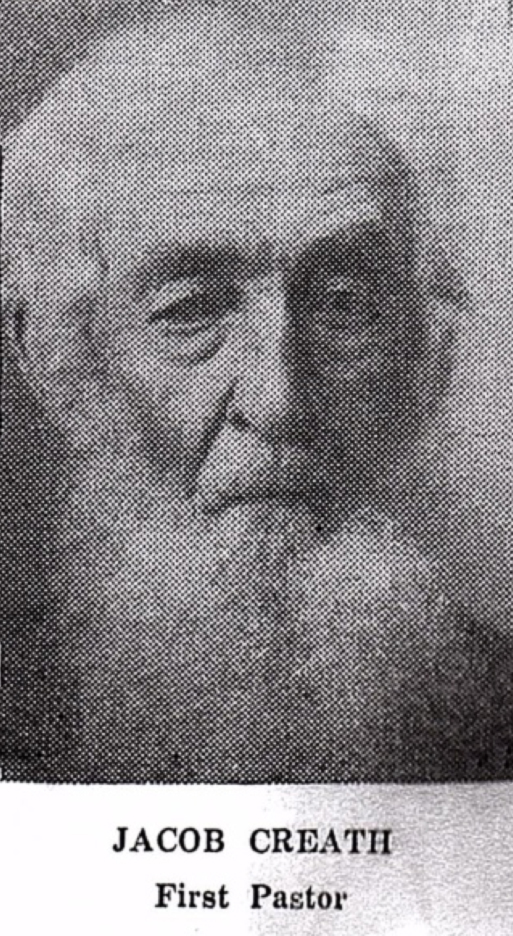
From a history on the Shelbyville Christian Church, Shelby County, Missouri
Contributed by Lloyd Pelfrey, 06.2019
![]()
Directions To The Grave Of Jacob Creath, Jr.
From Hannibal, Missouri, travel northwest on Hwy. 61 twelve miles toward Palmyra. Take S. Main St. into town. Head north through town on Main St. North of town, Main St. will take a sharp turn to the right. Just before the turn, a road leading straight ahead leads out to the cemetery (Cty. Rd. BB). Head straight ahead. You will see a cemetery on the left and on the right. The Creath grave is in the Palmyra Cemetery on the right. Go into the north entrance and immediately on the left, two sections, and next to the drive is the plot for the Creath family.
While at the cemetery, head across the road into the cemetery across the street. It is close enough to leave your car where it is, and walk across the street into the Greenwood Cemetery, and up the drive just a few yards and to the left to the grave of William H. Russell. He was a member of the Christian Church in Palmyra, and was a resident of the city. But, his claim to fame was that he was one of the founders of the Pony Express. His grave is impressive, with bronze plaques, along with acknowledgements of his involvement with that early mail system in the 1800's west. GPS Location of the grave: 39°48'39.4"N 91°31'20.7"W / or D.d. 39.810942,-91.522425
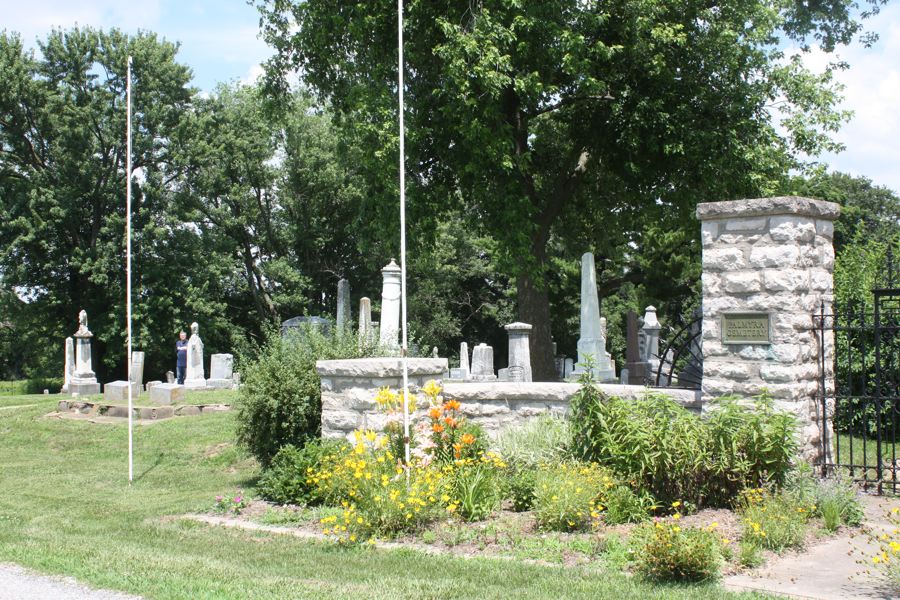
Scott Harp standing beside Creath Monument to the north of main Palmyra Cemetery entrance
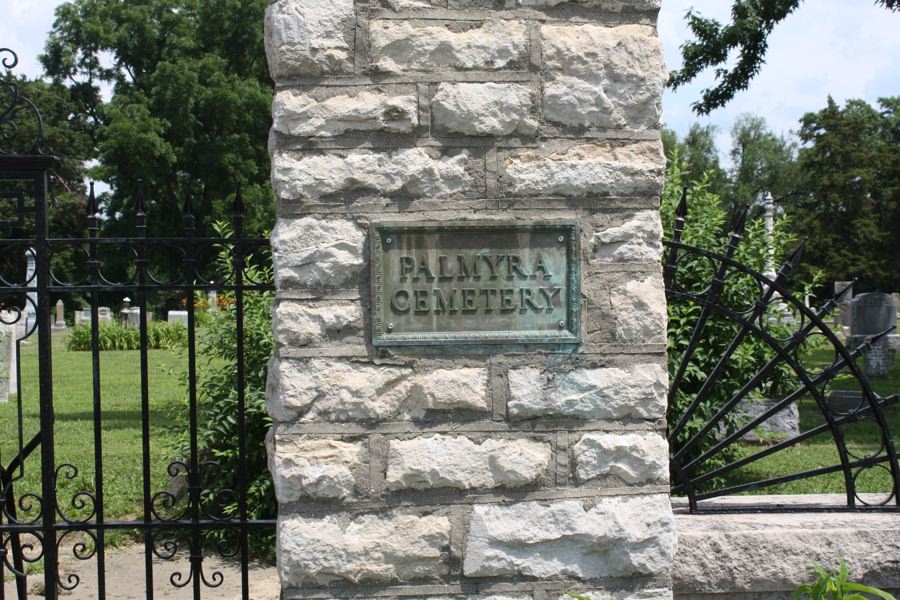
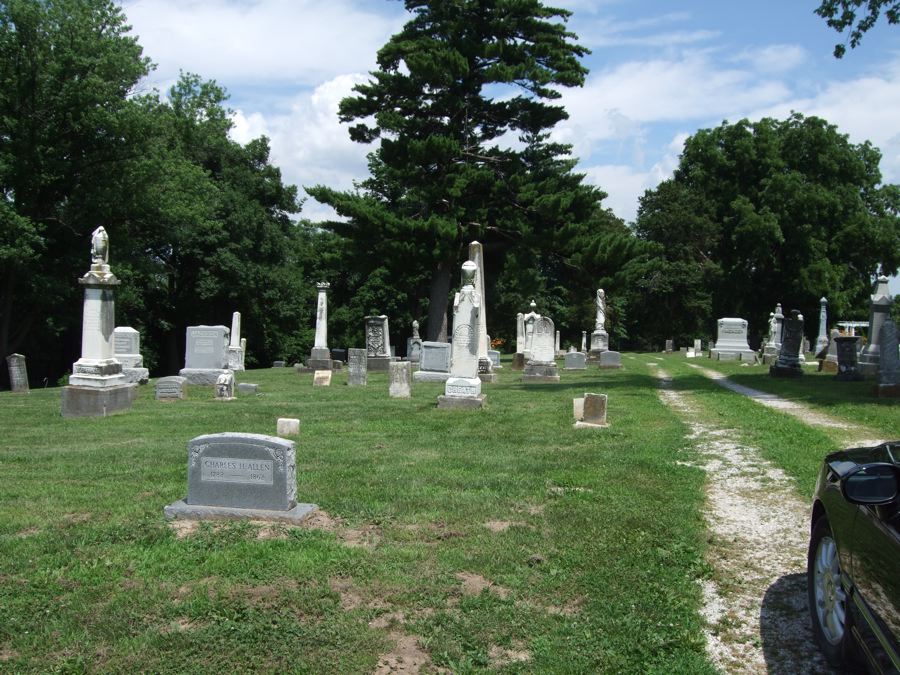
Creath Monument In Center Above
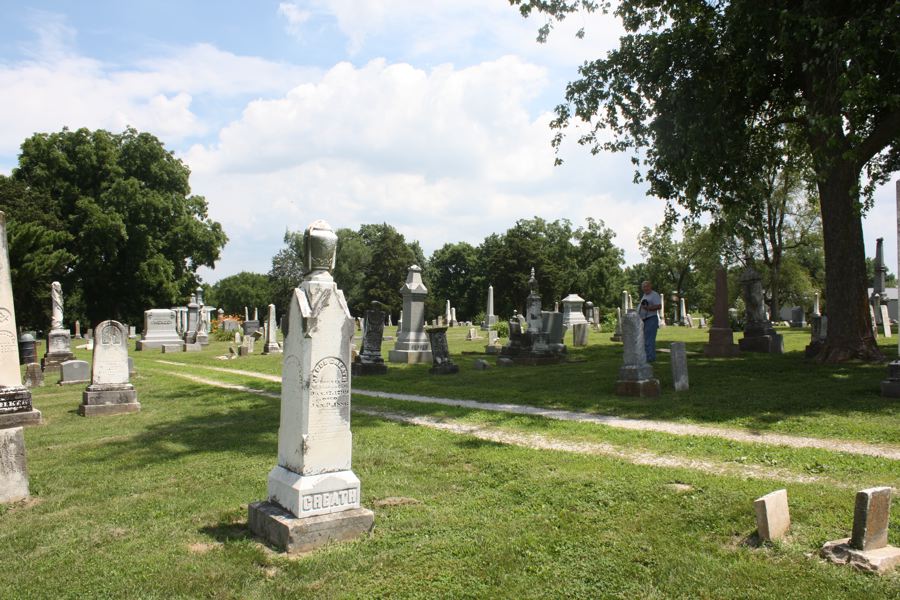
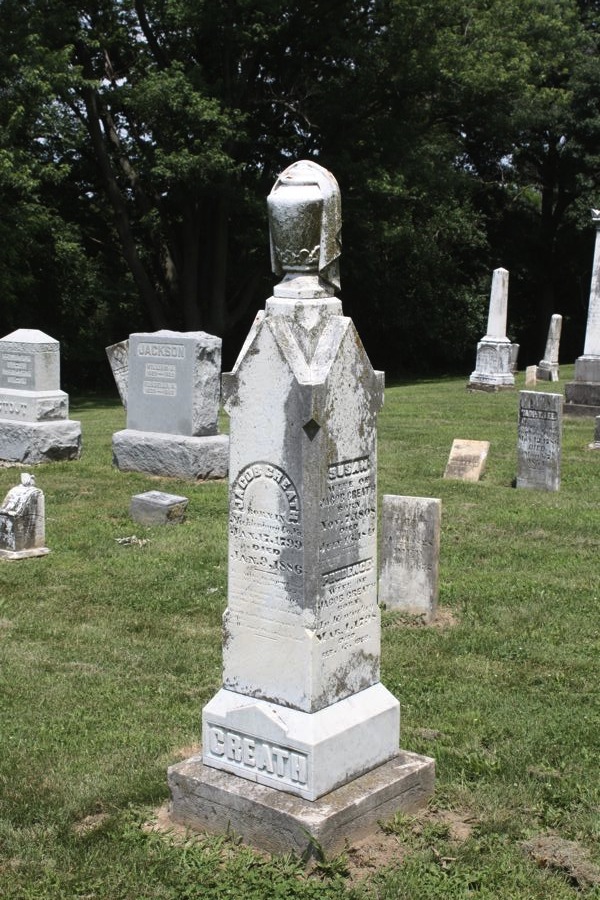
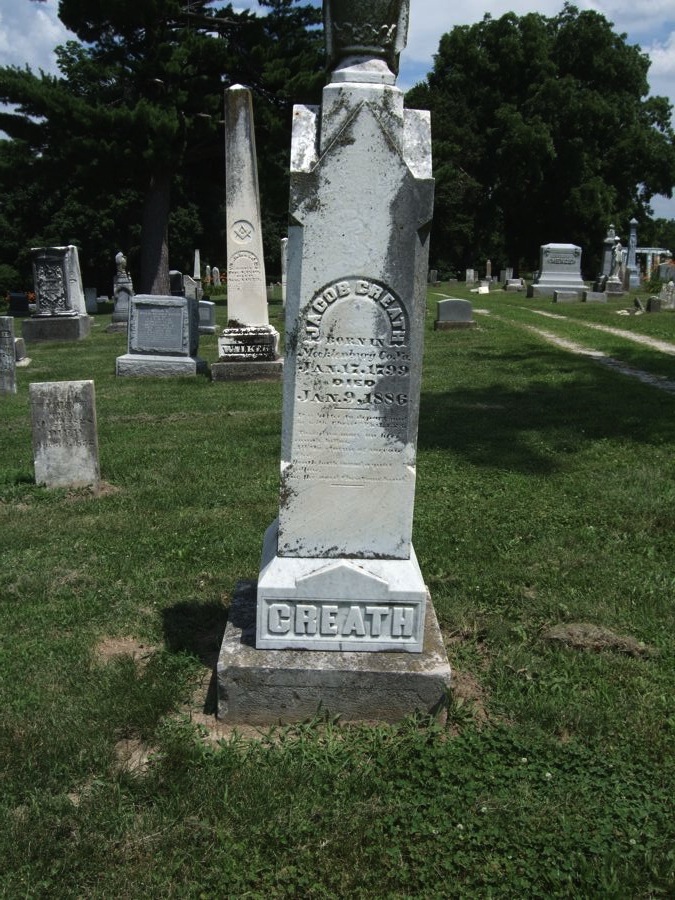
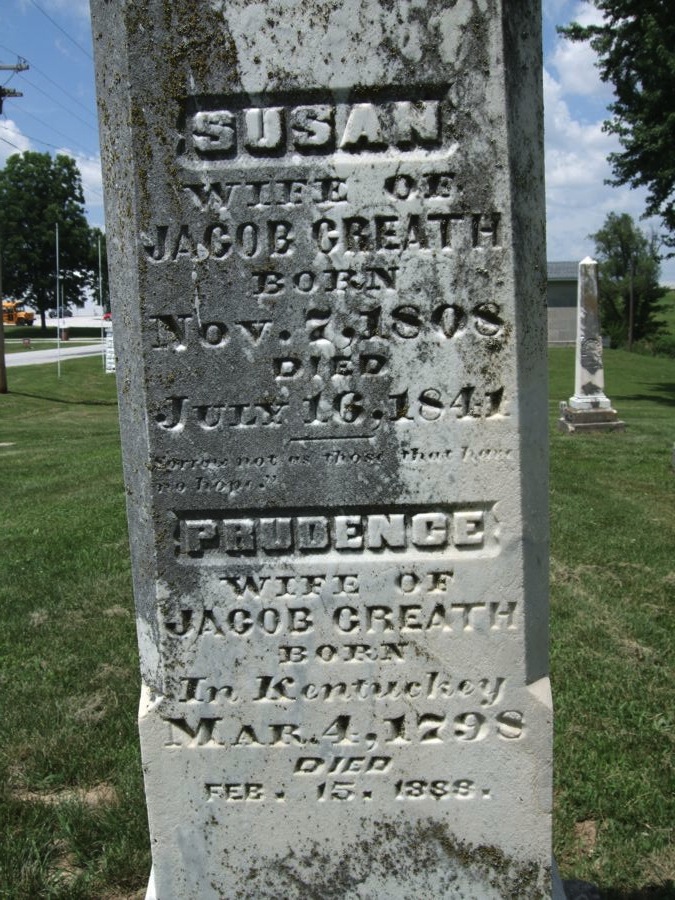
Susan
Wife Of
Jacob Creath
Born Nov. 7, 1808
Died July 16, 1841
"Sorrow not as those who have no hope"
____
Prudence
Wife Of
Jacob Creath
Born
In Kentucky
Mar. 4, 1798
Died Feb. 15, 1888
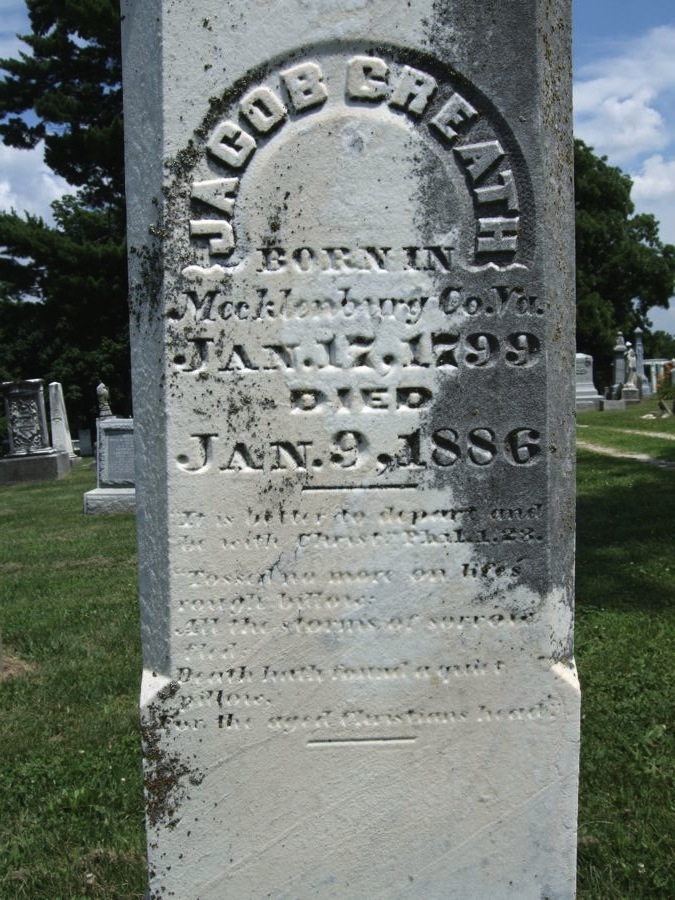
Jacob Creath
Born In
Mecklenburg Co., VA
Jan. 17, 1799
Died
Jan. 9, 1886
"It is better to depart and
be with Christ," Phil. 1:23
"Tossed no more on life's rough billows
All the storms of sorrow fled
Death hath found a quiet pillow
For the aged Christian's head."
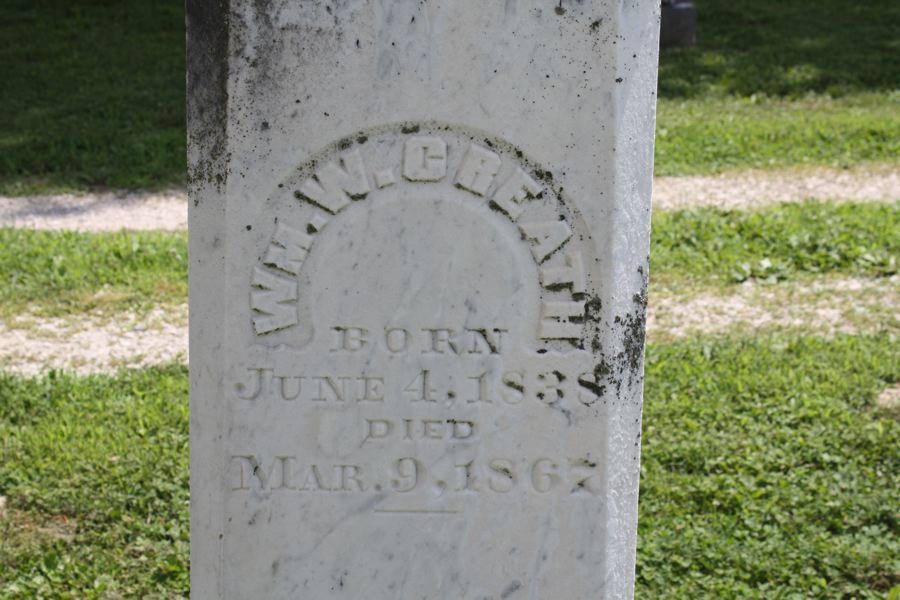
William W. Creath
Born June 4, 1838
Died Mar. 9, 1867
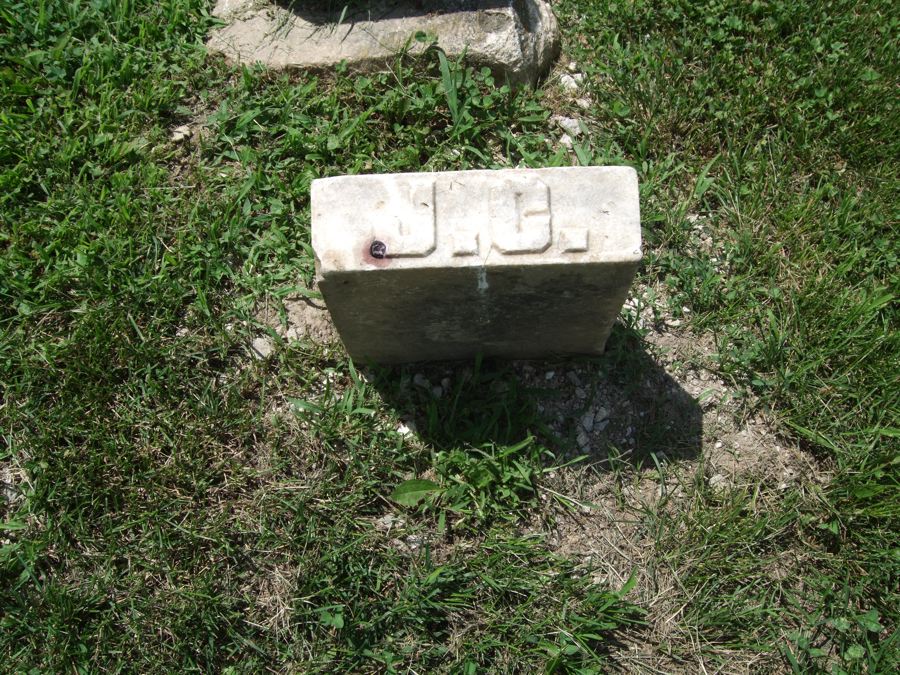
Footstone Of Jacob Creath, Jr.
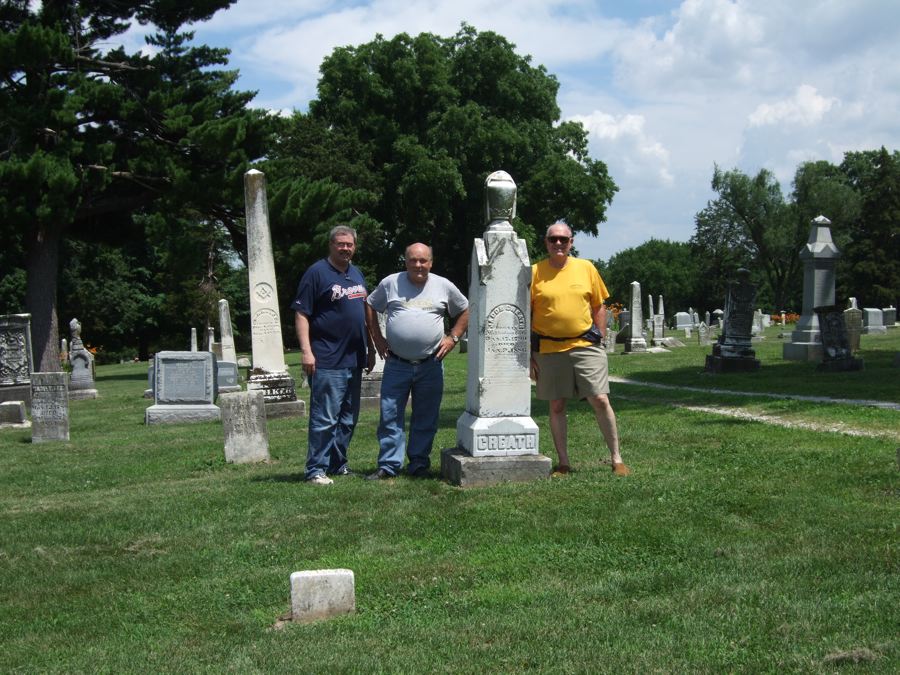
(LtoR) Scott Harp, Wayne Kilpatrick, & Tom Childers at the grave of Jacob Creath, Jr.
Special Thanks to Tom & Wayne for travelling with me in June, 2009 and taking many of the pictures you see here.
![]()
Palmyra, has a lot of historical significance. It is the town where the now infamous Palmyra Massacre of 1862 took place when ten Confederate Soldiers were killed in retaliation for the abduction of a local Union supporter, Andrew Allsman. The old jail where they were held still stands. The headquarter of the provost marshall during the Civil War is still standing. The county courthouse stands in the center of town, and city still holds to the old-town charm of a hundred years ago. Also while looking around on this site, be sure to visit the site for W.H. Russell, founder of the Pony Express and member of the Christian Church. He is buried just across the road from Jacob Creath in the Greenwood Cemetery.
![]()